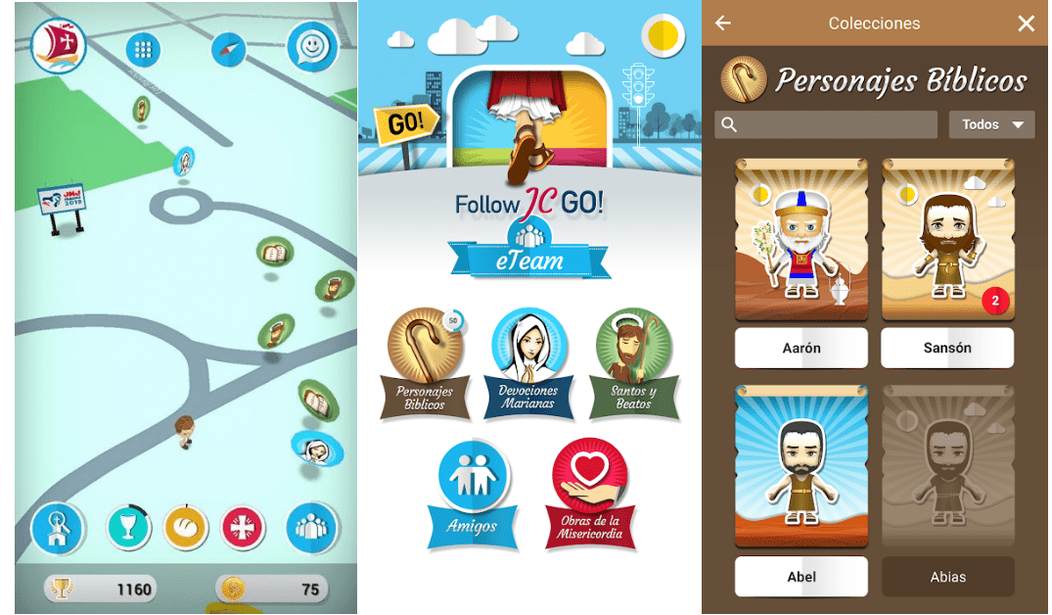Last week in Rome, the Vatican released a Pokémon Go-style app inviting young people to celebrate the Roman Catholic faith. Critics may call it a distraction from the clerical abuse scandal, and perhaps it is. Will the app make Catholicism more relevant for young people, or is it a painfully desperate ploy unlikely to have the same appeal as pocket monsters?
Britain’s The Daily Mail reported on the app, with George Martin calling the Catholic developers “canny” and quipping, “Gotta catch John Paul!” — a clever twist on the Pokémon slogan “Gotta catch ’em all!”
Rather than catching pocket monsters, the new app’s users will recruit saints by visiting different real-world locations and racking up four different resources: spirituality, bread, water, and currency. Each player has an evangelization team featuring famous Bible and historical figures such as Moses, Mother Teresa, and perhaps even the Virgin Mary.
Real-world locations will reveal different Marian advocates, saints, and other characters. Players recruit them not by capturing them in little balls but by answering a Bible or Christian history or theology question.
The game is also social — just like Pokémon Go — with ways to meet other players in real life, and encouraging them to team up for charitable work.
Fundación Ramón Pané, the organization behind the app, promotes the Roman Catholic “New Evangelization,” a movement to spread the Catholic version of the gospel among those who have fallen away, especially due to secularization.
The foundation takes its name and inspiration from Ramón Pané, a missionary anthropologist who traveled with Christopher Columbus and learned the language and culture of the native Americans in order to learn from them and preach the gospel to them.
“Following this evangelizing example, our Foundation seeks to learn the new languages of today’s society, not only as a language, but also in all forms of expression, understanding and communication, to present the Gospel, the message of God through the Sacred Scripture, from the Tradition and the Magisterium of the Church, attending to the real needs of the people,” the website explains.
Is Pokémon Go a kind of language? The popular smartphone app connects people around the globe and promotes exercise and social play with “Community Day”s and gym battles requiring users to team up. The app’s success does suggest games of a similar nature could do well.
As a user of Pokémon Go, however, I can let you in on a few secrets. This app is mostly drawn by nostalgia — at least in my area. Adults who grew up with Pokémon toys, games, and TV shows can relive the fun of their childhood years while walking around and meeting fellow enthusiasts.
It seems unlikely that Roman Catholicism would have quite the mass appeal. After all, the faith is much deeper than a child’s game and most kids who grew up Catholic remember being forced to participate and learn. None of this is meant as an attack on religion or Catholicism in particular — I am an Anglican and very sympathetic to the Catholic faith — but religion does not have the kind of consumer appeal that Pokémon does. The point of religion is to love and glorify God, not to be entertained.
Furthermore, Pokémon Go itself is not nearly the phenomenon it once was. Whenever Christian churches seek to appropriate secular culture, they usually follow with a lag. This means the vapid popular Christian music is not just less appealing than mainstream pop — it’s also old. “Follow Jesus Christ Go” may find itself marred by the same problem.
All that said, “Follow Jesus Christ Go” could work — among young people who are already Catholic. If parents allow their children to play “Follow Jesus Christ Go” instead of Pokémon Go, the kids may grow to love it. Some people who grew up Catholic may love playing the game, and some people with an interest in Catholicism may find themselves curious about it.
The app has a 3.1 star rating, with 1,535 reviews on the Google Play store, and a 3.2 star rating with 41 reviews on the Apple store. So far, the game has only been released in Spanish, but it will soon be translated into English.
Follow the author of this article on Twitter at @Tyler2ONeil.









Join the conversation as a VIP Member